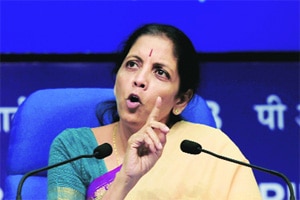A week ahead of the Brisbane G20 summit, where leaders of the world’s 20 major economies will, among other things, discuss ways to restore confidence in the multilateral trading system and the World Trade Organization (WTO), New Delhi on Sunday said the US and the European Union were now better appreciating India’s stance on food security and the importance of course correction to arrive at a solution.
“We still believe in going ahead with the Doha Round, including trade facilitation and the larger developmental issues that will address poverty (alleviation). Between July and now, the Prime Minister’s (Narendra Modi) interaction with the US President (Barack Obama) and our interaction with the European Union gives me confidence that there is a greater appreciation of our (India’s) position,” commerce minister Nirmala Sitharaman said.
Speaking at the India Global Forum 2014, organised by think-tank International Institute for Strategic Studies, she said: “We (India) are after all asking for what is only right in the name of human rights… I can very clearly say that we are moving with great hope. I expect that there will be greater engagement and some solution will come out of it which will calm down everyone questioning whether or not the Bali agreement will be recognised or whether it will all come down.”
India was not trying to undermine the trade facilitation agreement, the minister said, and termed WTO’s Bali package (on public stockholding for food security in developing countries, trade facilitation and a package for least developed countries) as imperfect.
“Government’s sovereign duty to protect its poor farmers is seen (by the developed world) as trade distorting. If the course correction has to happen, it has to happen now and that is what we (India) are demanding. We may not be waiting till 2017 to get what is due and what is not trade distorting,” she said, adding that India was committed to WTO as it believed in multilateralism as opposed to regionalism.
The Bali package had an interim ‘peace clause’ preventing WTO members from taking any developing country to the dispute settlement panel for violating the norms that the ‘trade distorting’ (agricultural) domestic support should not be over 10% of the total production. The package also said members should work on a permanent solution to reach an agreement by December 2017.
The WTO members had failed to meet the July 31 deadline for signing the protocol of Trade Facilitation Agreement (TFA), mainly due to India’s stance that an agreement on a permanent solution to the food security issue should be arrived at by December-end this year so that it can be implemented with the TFA and a package for least developed countries. India is challenging the calculation of domestic support at 1986-88 reference prices citing inflation and currency fluctuation since then, and therefore wants the base year to be changed from 1986-88 to reflect current market realities.
The Prime Minister’s Office had recently held a meeting with the commerce ministry on the WTO negotiations in the wake of the readiness shown by the US to discuss India’s concerns on food security. Although India is unlikely to retract from its tough stance on the issue, sources said it is evaluating a proposal for “a perpetual peace clause” till a “permanent solution” is found on the issue of public stock holding for food
security.
A peace clause like this would ensure that developing countries are not taken to world body’s dispute settlement panel even if their domestic support to farmers crosses the limits prescribed.
TFA was meant to ease global customs rules and add $1 trillion to the global economy in addition to creating 21 million jobs. India has since said it is not opposed to TFA, but added that while members engaged seriously and with commitment on TFA to quickly resolve issues, the same enthusiasm and urgency was not shown on the issue of food security. The EU had earlier said a confirmation of the open-ended nature of the interim solution can most probably be achieved. Once the Bali package is amended to include such a perpetual peace clause, India will not come in the way of signing the TFA, the sources said.

